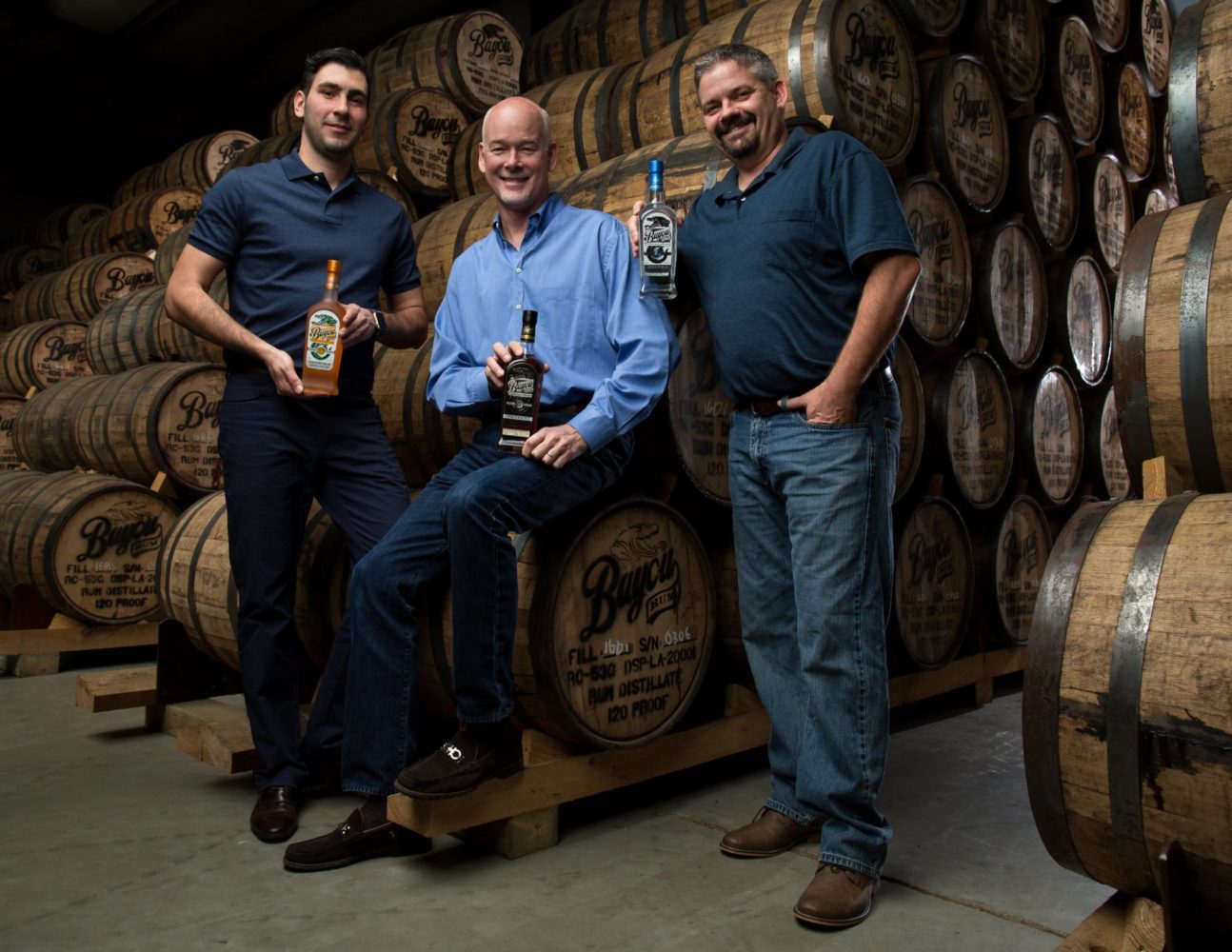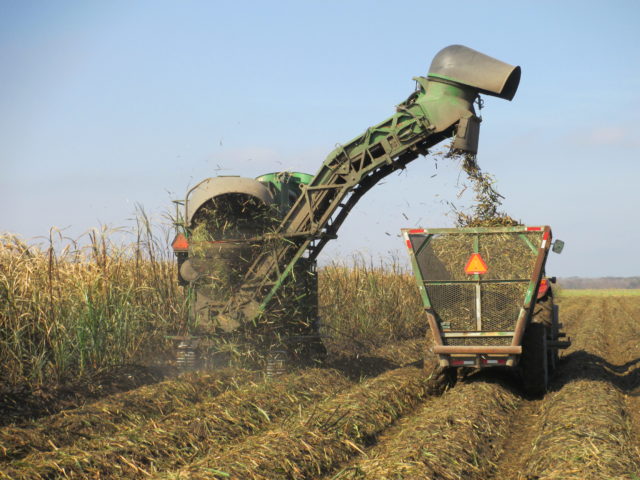Foodways
Sugarcane and Sweet Potatoes
Louisiana's 200-year-old tradition of rum production is revitalized, with distilleries sourcing the necessary raw material from farmers across the state
Published: March 1, 2018
Last Updated: May 18, 2022

Reiniel Vicente, Trey Litel, and Jeff Murphy of Louisiana Spirits.
In 2012, the Louisiana legislature passed SB64, allowing tasting and retail sales for distilleries. Since then, the industry has boomed, with multiple craft spirit producers making vodka, rum, gin, brandy, absinthe, and more. Several of these distilleries rely on Louisiana agriculture for raw material to create the fermentable liquid that becomes liquor.
Louisiana Spirits distillery’s Bayou Rum tour in Lacassine begins with more than just a nod to the sugarcane farm that provides the molasses and sugar crystals necessary to create rum; M. A. Patout & Son is so much a part of the Bayou Rum creation story that the image and words of Billy Patout are found throughout the distillery.
“He took such a special interest in Bayou Rum that we will never forget,” Louisiana Spirits President and co-founder Trey Litel said of Patout, who is now deceased. “Billy is featured in our video when people come on a tour.”
Litel and his team worked closely with Billy Patout to figure out the best combination of sugar products for Bayou Rum’s recipe. For example, when the team at Bayou Rum scaled up their industrial equipment, they found that the “rocks” Patout had sent were damaging their auger system.
“We had all this drama going on and it was a mess,” said Litel. “They very calmly educated us [that] these are not rocks. They’re sugar crystals. So, we put in a sifter to catch them, and now we carry those up and drop them in the warm water and they dissolve.” These sugar crystals are now used along with the traditional molasses in the distillation process.

Louisiana sugarcane harvest, courtesy of Louisiana Spirits, LLC.
Lance Weber, the general manager at M. A. Patout & Sons, has been working with Louisiana Spirits/Bayou Rum since 2012. He knows what the distillery needs and is in regular communication to figure out how to make the process more efficient.
“As a matter of fact,” Weber said, “we had a meeting about two months ago to work on a different way of handling the raw product coming to them, which would allow them to get a larger supply of raw product at a lesser cost. We bounce ideas.”
Two distilleries in New Orleans also support Louisiana agriculture. Roulaison is a rum-focused distillery sourcing its molasses from Lafourche Sugars in Thibodeaux, which processes sugar from several small family farms across Ascension, Assumption, St. Mary, Lafourche, and Terrebonne parishes. Roulaison co-founder Patrick Hernandez grew up in St. Mary Parish, which was an advantage to the distillery’s mission: “being close to the source,” as Hernandez put it.
Lafourche Sugars “really cared about where their product went and where it came from. We really liked that about them,” Hernandez said. “Before we did anything else, a year before we found a space, I went and visited the mill, got a tour from the general manager and used that as the foundation of, yes, we do have access in Louisiana. We can do that here. They’re willing to work with us no matter how small we are.”
Newly opened NOLA Distilling makes vodka, gin, and coffee liqueur with locally sourced sweet potatoes from James Deshotels Produce in Avoyelles Parish. They also distill rum with Louisiana molasses from Lula-Westfield Sugar and brandy with wine from Landry Vineyards in West Monroe.
Because of Louisiana’s tradition of growing and processing sugarcane, the state’s history of rum production dates back more than two hundred years.
NOLA Distilling founder Kirk Coco called upon two New Orleans businesses for ingredients in their specialty products: Press Street Gardens’ urban farm grows cayenne peppers for the distillery’s pepper vodka, and French Truck Coffee provides cold brew concentrate for their coffee liqueur.
Because of Louisiana’s tradition of growing and processing sugarcane, the state’s history of rum production dates back more than two hundred years. The new generation of distillers are using agricultural products from all corners of the state as inspiration for their missions and marketing plans.
“That raw material makes all the difference, and we put our raw material up against anybody in the world,” Litel said. “We believe that the quality of sugar coming out of Louisiana fields with four to six feet of Mississippi Delta topsoil is far superior than what they grow in the islands. It’s a cane variety that’s been adapted over 230 years to get to where it is today.”
Litel reiterated that Louisiana farmers are essential collaborators in the distillery business. “I know how to make rum,” he explained. “I’m not going to profess that I can farm better than a farmer. We team up with them because of their expertise, their knowledge, their history. It makes a way better product than if we were trying to do that on our own.”
————————
Nora McGunnigle is based in New Orleans and writes about culinary travel and culture. You can find her work in a variety of publications, including Louisiana Kitchen & Culture, Country Roads Magazine, Beer Advocate, Thrillist, and CraftBeer.com.
